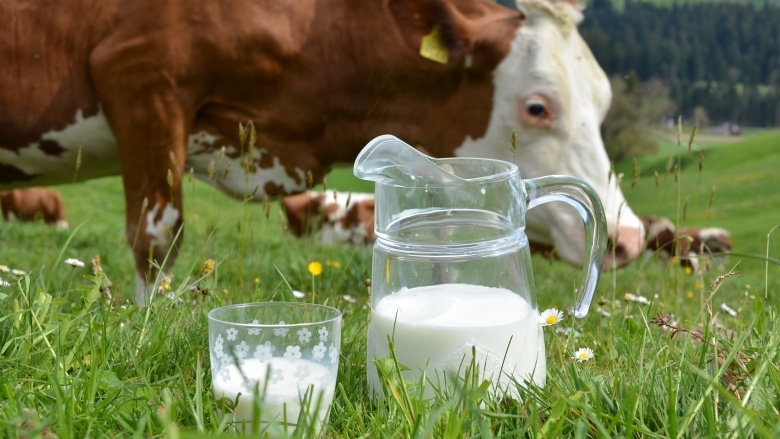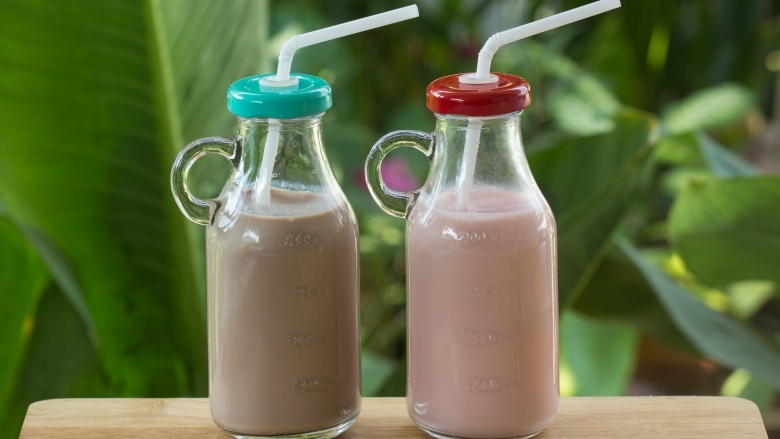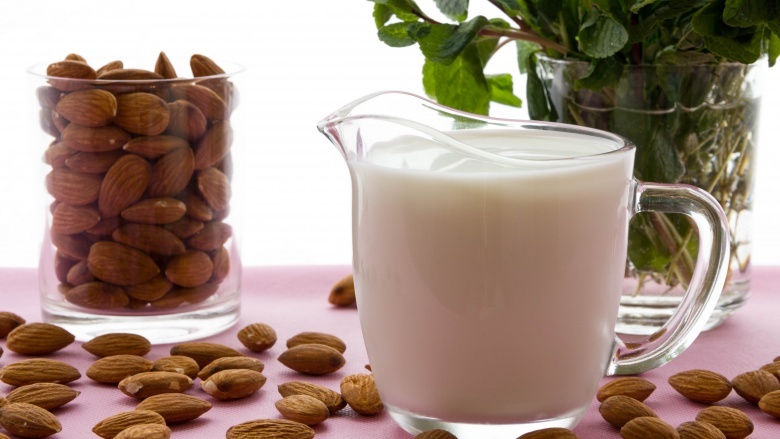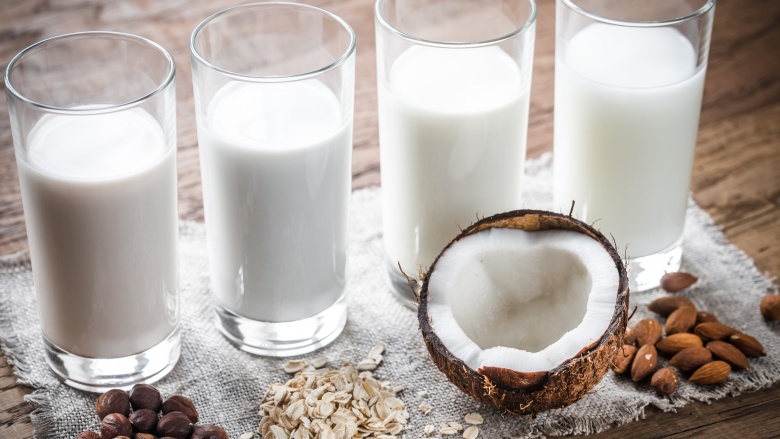What's Really In Your Milk?
If you think that the dairy aisle of your local grocery store is looking a little crowded these days, you're absolutely right. Gone are the days of having to choose between just milk and ... milk. Now, most of us are faced with a few types of animal milks, along with an endless selection of plant-based milks, flavored milks, and just as many milk products.
Deciding what's best for you and your family can feel overwhelming, so this is a look at the pros and cons of some of the most popular options. Should you make a switch, add another option, or stick with the tried-and-true choices? The choice doesn't have to be a hard one, it's just a matter of knowing what your family needs and what's most important to you. Let's take a deeper look at what's in each kind of milk to help you make a better, more informed decision.
Nutrition in cow milk
We'll start with the basics, and that means talking about the one that's probably in your fridge right now. If you have some cow milk on hand, you're in good company. It's been used by humans for at least 7,500 years, and today's scientific community has progressed leaps and bounds in determining what's good about it, what's bad in it, and why we've stuck with it. This old dietary staple remains a good source of calcium (which we need to maintain our blood and bone health), and it also contains a high amount of choline (which helps us manage our sleep schedules, sharpens our memory, and increases learning). The third big nutrient in milk is potassium, which our body uses to help prevent strokes. It also helps in the management of our circulatory system, and it's a crucial part of maintaining bone density.
Take a look at your milk. Is the milk fortified? Fortified milk has a bit extra added to it, and it's a great source of vitamin D. That helps to support our immune systems and again, it plays a part in keeping up our bone density. Vitamin D has also been linked with the production of serotonin, which helps regulate our energy and mood. Who doesn't want that?
Milk has also been linked with another part of brain maintenance. A study done by the University of Kansas found a connection between milk consumption and the presence of an antioxidant called glutathione in the brain, another newly discovered benefit for cow milk proponents.
Potential dangers of cow milk
Of course, even something with that kind of ancient history doesn't come without concerns, and you may have heard a lot lately about reasons not to drink your daily glass of cow milk. How wrong can almost eight millennia of human history be? Nothing's perfect, and there are some valid reasons for concern. Because it's so high in potassium and phosphorus, drinking milk can actually be dangerous for someone with impaired kidney function. If the kidneys can't remove extra nutrients, those nutrients will be dumped back into the bloodstream, and too much potassium or phosphorus can be deadly, in extreme cases. Too much calcium can also cause a problem and might lead to kidney failure or the development of kidney stones. Again, those are extreme cases.
One of the major concerns you might hear a lot about is the use of bovine growth hormones in the dairy industry. The major one is called bovine somatotropin, and it was originally developed in the 1930s. It was only mass produced in the 1980s. When it was evaluated and approved by the FDA, it was determined to be safe for human consumption largely because it exists as a protein that, if it enters into the human digestive tract, is broken down by our gastrointestinal systems. (And it's safe for the cows, too.)
It's also important to read the label on whatever kind of milk you're buying. The dairy industry is huge, and there's an equally huge number of ways milk is changed from its raw form before it hits the shelves. Low-fat types might be a healthier option for your family, but some (especially flavored milk and those marketed toward children) can have a ton of added sugars and sweeteners.
Should you buy it?
Don't worry, we're not going to tell you that you need to dump out your cow milk. Overall, the case is generally in favor of keeping that gallon in its place in your refrigerator. Concerns over calories and fat content in whole milk can be skirted by picking up some of the other milk options, and if you do, there won't be any loss of protein, calcium, and other good stuff. The exception to this rule is, of course, people who are lactose-intolerant. Advances in science and the preparation of milk might lead to major changes in this field, though, with some companies already marketing a lactose-free version of cow milk.
Cow milk has another advantage over other types of milk as well, and it's an environmental one. Those worried about the impact their eating and spending habits have on the environment might appreciate the fact that many areas can locally source their cow milk to cut down on transportation costs and environmental impact. The sources for milk alternatives might have a less green impact on the planet, and many supermarkets keep local dairy farmers in business.
Nutrition in soy milk
Soy milk remains one of the major options for those who are looking for an alternative to an animal milk, and it's probably one of the first alternatives you saw pop up on shelves. Soy milk is made by grinding up soybeans that have been soaked in water, then straining out the remaining solids. The resulting milk is incredibly high in protein and potassium, and it has little of the fat that concerns many people about cow milk.
Like cow milk, soy milk can also be fortified to enhance its natural benefits. If you're concerned about filling your daily requirement of calcium, fortified soy milk often contains all the calcium you might need with none of the lactose that can cause some to have a bad reaction to other types of milk. When it comes to calorie content, soy milk is generally about even with skim cow milk. Part of the popularity of soy milk also comes from the fact that it's free of cholesterol, and keeping an eye on cholesterol is an ever-present concern for many people.
The potential dangers of soy milk
Studies have shown that soy milk might be something of a double-edged sword, and if you're making decisions with a family in mind, you might want to think twice about switching. One study, done by Harvard University, found a link between consumption of soy milk and lower sperm concentration. Studies have also looked for a connection between soy consumption and breast cancer, but the findings on this have been vastly inconclusive.
Another potential downfall to soy milk is that soy tends to block some of the body's ability to absorb nutrients, which might cancel out some of the benefits you think you're getting by drinking it. According to the American Nutrition Association, soy milk can also cause some major problems when given to young children. Since children need a certain amount of cholesterol for the healthy development of their nervous system, substituting in soy milk may cause serious damage to a child's growing body.
It was also found that children who consumed soy milk suffered from hormonal imbalances, and the high levels of estrogen found in those children made researchers wonder if it might be linked to the development of certain cancers in adults. (Again, the verdict is still out on that.) It's also possible to develop an allergy to soy, especially when exposed to it at a young age. Too much soy, even in the diet of an adult, means an increased risk of developing an allergy, and it has been known to cause bloating and discomfort for some people. If you're trying to get rid of lactose in your diet, soy might not be a good choice in the long run.
Should you buy it though?
It all comes down to lifestyle choices and reading labels. Soy can be a heart-healthy choice in moderation, but reading labels and making sure you're picking up healthy fats and calcium elsewhere is key. You also need to be careful about products with added sugars, which can make this option decidedly unhealthy. According to a statement from Duke University's Diet & Fitness Center, anyone looking to add soy milk to their diet should remember a few key things. In order to get the benefits of lower cholesterol without setting yourself up for additional risks, the daily recommended amount of soy is 25 grams. Moderation is key (this can't be stressed enough), and the best way to use soy milk is in conjunction with a type of dairy milk.
Nutrition in almond milk
Seriously. Who doesn't love almonds? They're healthy, they're tasty, they're a great snack, and they have a flavor that goes great with anything you can possibly imagine having for breakfast, from pancakes to milkshakes. So it's probably not surprising that almond milk is one of the most popular, non-animal milks you can get. It's essentially almonds that have been pulverized into a near-liquid form, then strained to remove any leftover pieces and mixed with water. The resulting milk definitely has its nutritional benefits.
Almond milk can be a valuable replacement for animal milks, especially for people who are trying to lose weight or for those who are watching their cholesterol. It's super low-calorie, with each serving averaging only about half of the calories found in cow milk. It's also completely cholesterol-free, which means it has some major things going for it. Heart disease is a big health problem in today's world, and with countless people trying to lower their cholesterol, almond milk can be another weapon in the arsenal. Almond milk has also gained popularity based on something else it lacks: lactose. While cow milk can mean a world of pain and discomfort for some people, almond milk is completely safe for the lactose-intolerant.
The potential dangers of almond milk
There are a couple of things to be aware of before making the switch to almond milk. Almond milk is much, much lower in protein than cow milk, and since a single serving includes only about 1 gram of protein (in comparison to the 8 grams per serving found in your faithful gallon of cow milk), that doesn't make it a good source.
If you're hoping that a glass with breakfast will get you all the nutritional benefits you would get from a handful of almonds, that's probably not going to happen either. Some of the vitamins are removed after the almonds are pulverized, but like other types of milk, fortified versions can replace some of the missing nutrients. Fortified almond milk tends to have high calcium levels, along with high levels of A, D, E, and B-12 vitamins. But that varies, and you really need to read the labels to see what you're really getting.
While you're looking at those labels, watch out for words like "sweetened." Picking up a container of that stuff means you're drinking a whole lot of sugar that's going to counteract any health benefits you might get by switching. Check the nutrition panel and see if that vanilla flavoring includes a ton of sugar.
Should you buy it or not?
If you're trying to replace a normally heavy breakfast with something a little more health-conscious, almond milk can be used as a substitute in things like smoothies, in your coffee, on cereals, or in oatmeal. (Or milkshakes, if you're really doing breakfast right.) In some cases, the nutty taste can bring a whole new flavor to old favorites, and if you like the taste of almonds, you may find it a complete win. Overall, it'll help you cut back on some of the fats and cholesterol that you're trying to stay away from, but it's still a case of buyer beware.
Almond milk isn't recommended as a complete milk replacement for children under a year old. With no real protein content to speak of, infants who are given only almond milk can develop nutrient deficiencies that can cause more problems down the line. For adults, though, it can be an excellent non-dairy milk substitute (as long as you don't have an allergy), and as long as you're careful about reading labels and avoiding the sugar-heavy versions that include most flavored almond milks as well as the sweetened varieties.
What's up with evaporated milk and condensed milk?
Some recipes call for evaporated milk and some call for condensed milk, and it's easy to get the two confused. (We've all been there. We've all stood in the store and forgotten what we were looking for. We've all chosen poorly.) They look almost identical and they are, in fact, pretty close to it. Both types are milk that has had around 60 percent of the water removed, and the difference is in the sweetness.
Condensed milk, whether the can says sweetened or not, contains at least 40 percent sugar. The sugar is added to the milk after the water is removed. If no sugar is added, then it's evaporated milk. The easy way to tell which one a recipe calls for is to remember that condensed milk is for sweet things, and evaporated milk is for savory. They're not interchangeable, and adding the wrong one can ruin a whole dish.
Should you be buying them? Sure. Because both have been canned and processed, it's perfectly fine to buy a few extra cans and keep them in the cupboard for a while. Condensed milk is handy to have around to make your own caramel sauce, and since it also adds a bit of sweetness to your tea or coffee, it can be a lifesaver if you happen to run out of your normal milk or creamer.
Evaporated milk is also handy to have around. If you're keeping an eye on your calorie and fat intake, evaporated milk can be used as a substitute for heavy cream, and it'll help make creamy soups and casseroles feel not quite as guilty. In a pinch, it can be used as a recipe substitute for milk, too.
What about all the other trendy new milks?
So what's up with all these new players in the milk game?
Some of them are actually very old players. Goat milk is popping up on shelves more and more, in both milk and cheese forms. The nutritional value is similar to cow milk. Buffalo milk is incredibly high in fat and casein, which makes it ideal for cheese-making. Camel milk is essentially a slightly salty-tasting version of cow milk that is much higher in vitamin C, which makes it an excellent replacement for anyone who doesn't have access to (or doesn't like) fruits and vegetables. Sheep milk is high in fat and protein, and has a composition that makes it perfect for yogurt and cheese.
There are also other types of non-dairy, non-animal milks that are hitting the shelves. Coconut milk is lactose-free and contains a high amount of vitamins like C, E and B. It's also high in fiber, but since it has a significant amount of fat, too, it should probably be avoided if you're worried about your heart health. Rice milk is another alternative, and in addition to often being fortified to contain all the good stuff you want from your milk, it can be a viable option for those with a lactose intolerance, lactose allergy, or a nut allergy.











